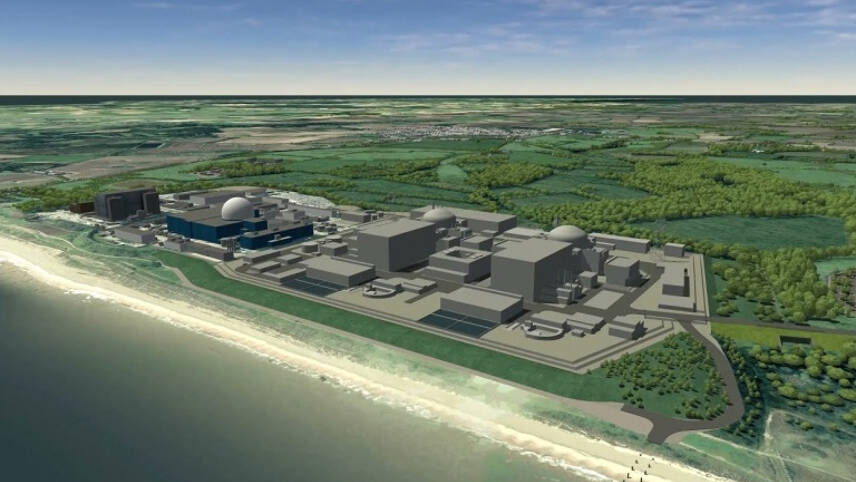Register for free and continue reading
Join our growing army of changemakers and get unlimited access to our premium content

An artist's impression of the Sizewell C site in Suffolk. Image: EDF
On Sunday (21 August) and this morning (22 August), several of the UK’s largest media outlets have reported that Johnson, in what will be one of his last acts as Prime Minister, has given the green light in principle for funding for the plant along with Chancellor Nadim Zahawi.
This is despite the fact that Johnson has repeatedly stated that we would not be making further major decisions before leaving office. Either Liz Truss or Rishi Sunak will be appointed as his successor in the first week of September.
The decision concerns only government funding for construction; a final public investment decision is due in the first quarter of 2023, with public funding costs estimated to be in excess of £20bn.
A spokesperson for the Department for Business, Energy and Industrial Strategy (BEIS) told edie that the reports can neither be confirmed nor denied. They said that “negotiations are still ongoing on Sizewell C and as these are active and commercially sensitive discussions we cannot comment further”.
“Nuclear power has a key role to play as we work to reduce our reliance on fossil fuels and exposure to volatile global gas prices,” the spokesperson added.
Divided opinion
It is thought that, if Johnson has given the go-ahead in principle, this could split Conservative opinion. Some are understood to be critical on the grounds that other Ministers were not told, particularly given the size of the funding commitment.
In a letter leaked to the media, Treasury Minister Simon Clarke stated that the costs involved were “sufficient to materially affect spending and fiscal choices for an incoming government, especially in the context of wider pressures on the public finances”.
The decision is also, as expected, being challenged by some of the environmental and community groups which have been opposing Sizewell C for some time.
Campaign group Stop Sizewell C issued a statement reading: “Whatever way you look at it, this is a very dodgy decision. Has it been made by a lame duck PM who is not supposed to tie the hands of his successor, or was it in fact made before Sizewell C was granted planning consent, lending serious weight to our conviction that this was a prejudiced, political decision?”
Nonetheless, Sizewell C does have some staunch supporters aside from Johnson and Zahawi. BEIS lead Kwasi Kwarteng had been pushing for the decision. He was the architect of the change of the funding model for new nuclear projects from the Contracts for Difference (CfD) approach to a Regulated Asset Bade (RAB) approach, brought in to reduce the risk to investors in large nuclear projects. He was also a key supporter of the Energy Security Strategy which envisions nuclear accounting for 25% of the UK’s electricity demands by 2050.
Kwarteng is backing Truss in the Conservative leadership race and it is believed that he would be in her cabinet if she is successful.
Development consent was granted for Sizewell C in July by Kwarteng. He stated that there is a “very substantial and urgent need” for the plant in the face of the energy trilemma – cost, carbon impact and energy security. This, he claimed, overrides concerns about the plant’s potential impact on a nearby local nature reserve and about its projected water consumption. The Government is facing a legal challenge to the decision on these grounds.


The energy generation in the UK should have at least the base load met by nuclear generation.
No CO2 and small volumes of waste which can be very safely handled.
Before retirement, I did spend 35 years as a scientist in the research branch of nuclear energy.
I was there very nearly from the start.
Richard Phillips